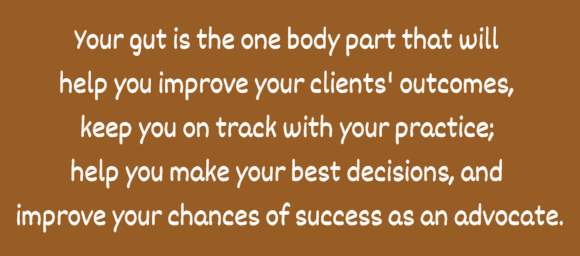I’m guessing you don’t think of your body parts as making important contributions to your advocacy career.
But they certainly do! In the past we’ve talked about the importance of your ears (listening). I could also focus on your brain (a – ahem – no brainer), or your fingers (which dial your phone or type your emails) or even your feet (which take you to meet your clients).
While those may be important, none are as important as the one we’re looking at today. Today we’re going to take a look at the one body part that will help you improve your clients’ outcomes, keep you on track with your practice; help you make your best decisions, and improve your chances of success as an advocate. Today we’re talking about your gut. (OK – I suppose this use of “gut” may not be classically thought of as a body part – but roll with me on this one, please!)
No, I’m not peddling probiotics, nor discussing the latest in stomach remedies. Nor am I looking at your decision to eat healthy – or not.
Instead we’ll focus on your gut as it applies to making decisions, helping you overcome hurdles, and finding the best answers – the ones that work best for you and your clients. As in, “Go with your gut!” or “Trust Your Gut!”
For me, learning to follow my gut has been an evolution. It wasn’t how I was raised. I was raised to make big or important decisions by reviewing pros and cons, sometimes in lists, perhaps on paper. Do the math, or figure out consequences – whatever was appropriate to the situation.
But sometimes, no matter how comprehensively I listed pros and cons, and no matter how accurately I interpreted those lists, my decisions did not work out well. Those errant decisions included my first marriage – which failed miserably – and choosing a business partner who tried to put us into bankruptcy. On paper, with lists of pros and cons, and using the method I was taught to use, they looked good, but they were still bad decisions.
As I got older, and my decisions took on even more gravity (because by then I needed to make them not just for myself, but for my children, too), there were times when I could look at those lists of pros and cons and realize that no matter their “logic”, they just didn’t make sense. By then I was divorced, and my alcoholic ex was doing stupid things, like kidnapping my daughter from daycare, and totalling the car with her in it. I found myself making choices based on something else – undefined – but more of a brain-power-meets-emotion approach. Sometimes things just “felt” right or wrong. There was a little voice that sent me in one direction, or another. There was a sixth sense that suggested answers…. different answers… it was my gut providing guidance.
I stopped making lists on paper. I stopped trying to total the items in each column. Instead I went with the little voices. I listened to my sixth sense. I began to trust my gut feelings, and use them to make decisions.
Since making that shift, I honestly cannot think of a single time that trusting my gut has steered me wrong.
It was my gut that made me pursue better answers when I was diagnosed with terminal lymphoma. It was my gut that suggested I could build a new business using that horrible experience. It was my gut that allowed me to marry my second husband 10 years ago – even though I had known him only three months! (And today, it remains the best decision I ever made 🙂 ) None of those decisions ever would have passed muster with the oh-so-logical pros and cons lists.
If you stop to think about it, you, too, will think of many ways that following your gut can be the best way to make decisions. Some examples:
- A client asks you to do something that skirts the edges of the advocacy code of ethics, and knowing that you really need the income this month, you give it serious thought. But your gut tells you that making that extra $500 may cost you far more down the road. Do you give in – and add $500 to your account? Or do you stop yourself knowing you’ve “simply” kept your integrity intact?
- You spend way too much time on the phone with a potential client who calls you back over and over again, telling you she is trying to decide whether to hire you. Each time you take the call, find yourself talking to her a half-hour at a time, several times over the course of a couple of weeks. You tell yourself you keep doing it because you hope eventually she’ll sign your contract and you can proceed. But your gut tells you she’s really just picking your brain and she’ll never cough up payment for you. So what do you do?
- You go with your client to a doctor appointment, and the doctor (who your client really adores – he’s so nice to her!) not only seems to rush through the appointment, but is also not happy with you when you ask questions on behalf of your client. You also have a sense that he’s not sharing everything she needs to know, including a treatment option you’ve read about that you think he should be discussing with her. It makes her nervous for you to question him…. (“He’s such a nice young man!”) and yet you are certain there’s more information she needs. Do you leave it alone? Or do you take steps to be sure she gets that additional information? or?
In all these cases, what does your GUT tell you?

Learn to trust your gut. Learn to treasure and appreciate its guidance. USE it. As a care professional, as in all of life, it’s your best body part.
…………………..
LEARN ABOUT APHA MEMBERSHIP | FIND MORE REASONS PATIENTS NEED ADVOCATES






Thank you for choosing to address this important topic!! I couldn?t agree more.